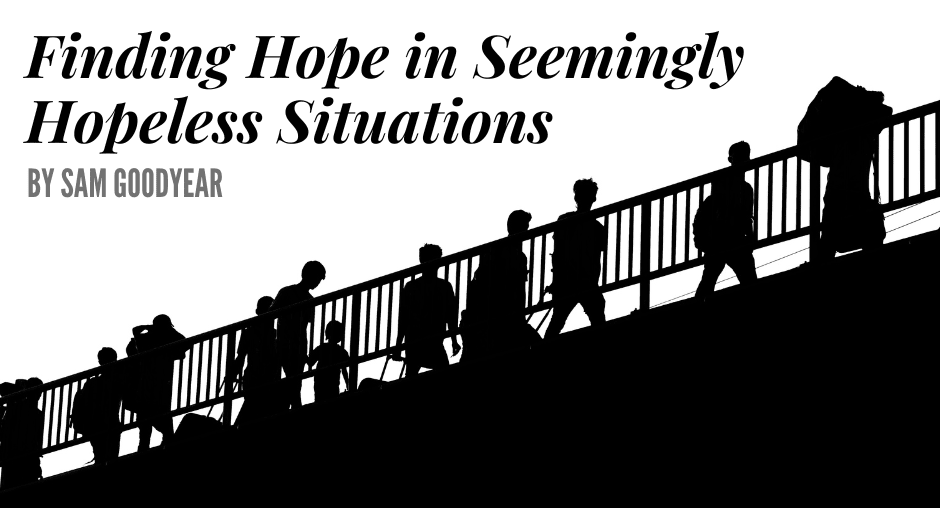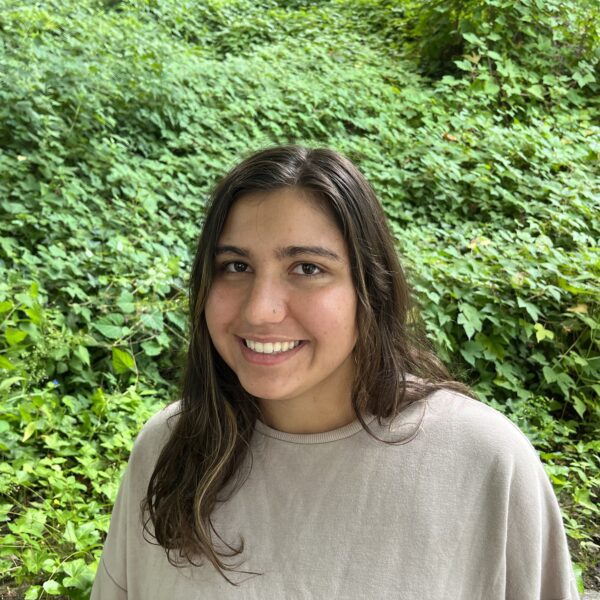Finding Hope in Seemingly Hopeless Situations

Editor’s Note: When someone asks DC Service Corps member Sam Goodyear what she does for a living, she is always a bit unsure how to respond. Here, Sam gives us a full answer with a glimpse at her challenging but rewarding work at the UN Refugee Agency. She shares her experience talking with migrants and connecting them to much needed resources, and reflects on hope as the heart of her work.
I know a lot of people who don’t like small talk. I assume this is fairly common, and I find that good. Or helpful for me right now, anyway. Because, avoiding the passing of several minutes of aimless conversation isn’t a challenge for me when I meet new people. I’ve found that, often enough, the conversation follows a very similar pattern: After general name introductions, a handshake where both parties questioned whether or not the physical contact portion was necessary, and perhaps some other brief exchange of words, the question comes in: “So, what do you do?”
I laugh a bit to myself when I hear this, because there isn’t one aspect of my current role that makes for particularly light conversation. “I work at the UN Refugee Agency” I share, well aware that they asked what I do, not where I work. I then attempt to quickly determine what other information I will provide based on my assessment of their reaction.
“How can I sum this up without being too sad, or sounding too controversial?” I find myself thinking. “But it’s not controversial, it’s human rights, that shouldn’t be controversial, right?” I counter myself. The questions spin in my head.
If I conclude that this question was asked simply out of politeness—this is more of a business exchange—then I may provide any of the following information: My role is a Protection Counselor. I work on the Individual Case team under the Protections & Solutions Unit for the United Nations High Commissioner for Refugees Multi-Country Office of Washington D.C.
Then either I have covered the bases of sharing my role and simultaneously deterred this person from desiring to ask more (there were way too many words that needed unpacking in there), or the person shows deeper interest and we go from there.
If you, reader, are now interested in this insider information about what my work does consist of, rather than hearing what version I may share to said stranger, it’s something like this:
I am a main point of contact for individuals who reaches out to UNHCR in the US with a request for assistant relating to an application for asylum or other similar protection case. There are many UNHCR offices globally; the one I work at focuses mainly (naturally) on U.S.-related topics. So, if someone contacts us via email, phone call, letter, walk-in (we don’t take walk-in meetings or appointments but sometimes they happen), I may be the one to talk to them. Typically, that means I hear from individuals who are seeking asylum in the U.S (which is recognized by countless countries including the U.S. as an international human right) or who were attempting to seek asylum here and were then detained. And while detention centers in the U.S. are not meant to be punitive (i.e. prison), the concept and conditions of them are scarily similar (neither of which are exactly humane, but that’s another topic.)
I get to hear the stories of many individuals including the reasons why they fled their homes, and I then connect them with any asylum resources that they might be in need of. Which, very frequently, tends to be legal resources. Which, as I share with these callers to check-off the expectation-setting part of my role, tend to be very limited. There is a lot of need for pro bono attorney work and not enough resources to fill that demand in any capacity. So unfortunately, “You can give these numbers a call, though they may not be able to take your case,” is what I often share, which is just another blow because I started this call by explaining that UNHCR does not provide direct representation in individual cases, nor wan it provide legal advice through our helpline.
Many (or all, one can assume) become frustrated with being held in these detention centers, as there are very few instances when a person is allowed to leave one once they’ve been taken in (whether or not they have the desire to return to their home country as a result of the harsh conditions they experience here). Unfortunately, when they express this frustration or desire to leave, I have to also share the bad news: “The UNHCR cannot facilitate movement within the U.S. or to any other country,” so, “You’re stuck,” is essentially another way of putting it. Probably. Unless this person was granted bond or some other form of release from an immigration detention center, which does not seem to frequently be approved, as there are many factors a person has to be able to show in order to get approved. In some cases, a person can apply for something called voluntary departure, which allows the person to be permitted to return back to their home country or somewhere they have legal recognition, but even then this needs to be determined in a hearing that may or may not get scheduled in the near future, and then approved by an immigration judge. But, like I mentioned before, seeking asylum is a human right which is recognized under international law, which the U.S. does subscribe to, and people should not be penalized for it under our law. (I say this with growing disbelief and disappointment in the U.S. immigration system.)
Oh, back to what I do. I go into the office (or work from home on one of my beloved 2 hybrid days per week) and, well, work. I continue to do a lot more things that can hopefully, maybe help a person who is in a poor situation, but a lot of times the documents I send in order to help may only be helpful in limited cases, including: if the person fits certain criteria, can prove their situation, and is awarded a hearing before an unbiased judge where they will be deeply listened to and their evidence thoroughly considered before determinations are made. Though, having an opportunity to ask for asylum in court can also only happen if the person was able to file several documents within the brief time window that U.S. law allows (whether or not people have a way of knowing those laws…). This is also assuming that the person speaks English fluently, because that’s the language in which they’re required to fill out all official documents—despite these documents being applications for asylum from another country the individuals were forced to flee from. And, because there isn’t access to computers or other resources in most of these facilities, google translate is not accessible, and phone calls are not always free.
But, as long as the person was able to complete those documents pristinely, timely, with all criteria perfectly met—and government documents are not exactly the easiest to understand (in any language, let alone a foreign one), and anyone who does taxes can attest to this—then this person can hopefully get that chance to be heard in court to determine if they can be granted asylum. The entirety of this process can take weeks to months to years, which a person will likely undergo while still held in a detention center. Which is all especially unfortunate, as this is all occurring after a person may have faced immense trauma before leaving their home, as well as on their journey of getting to the U.S. in general, one can imagine.
I know that reading these things is not the most hope-instilling. They are not the most hope-instilling things to be confronted with even while in a comfortable and professional office in a lively part of Washington, D.C. But unfortunately, it’s the reality that many people who are seeking asylum in the U.S. face, and I think that if they could tell you, like they sometimes tell me: it isn’t the most hope-instilling process to experience. It’s gruesome and inhumane.
You may by now recognize that I still really haven’t summarized the tasks that I do daily very well. I presume you also are starting to understand why I am no longer faced with much opportunity for initial small-talk. But, as I mentioned briefly earlier, the tasks I do are something along the lines of taking phone calls, mailing out packages of resources that can be helpful to a person, and actually, a lot of other things, too, but if you were the person standing in front of me who just shook my hand, I think it would be better to just cut that part short.
There are times where I find this work challenging—where I feel intense emotions or have to momentarily disconnect from emotions at all in order to keep moving forward. But despite those experiences, I can remind myself: if all of this allows the person at the other end of the phone to be with their family again, to have a life again, to see the sky again, to sing, to dance, to cherish, to eat fresh food, to swim in the ocean, to hug, to cry… then I want to do whatever I can. Even if a positive outcome seems unlikely, if there is a chance, then it’s worth it.
And while I, one person working to help people in response to a powerful system, may not be enough to combat the cruelty that many undergo (and will never be enough), providing tangible materials of assistance to people who did not ask to be born into or endure such difficult conditions can create an outcome that is real. So, I go to my office, take those calls every day, print my materials, make my packages, submit information to our databases, and do some of the other overwhelming and/or tedious tasks, because to love is to try.
So, in response to the question, “What do you do for work?” I try. Like I hope someone would do for me.
Question for Reflection: How do you remained hopeful in difficult situations? What are some new ways you could try to serve those who need it most?
Tagged in:

